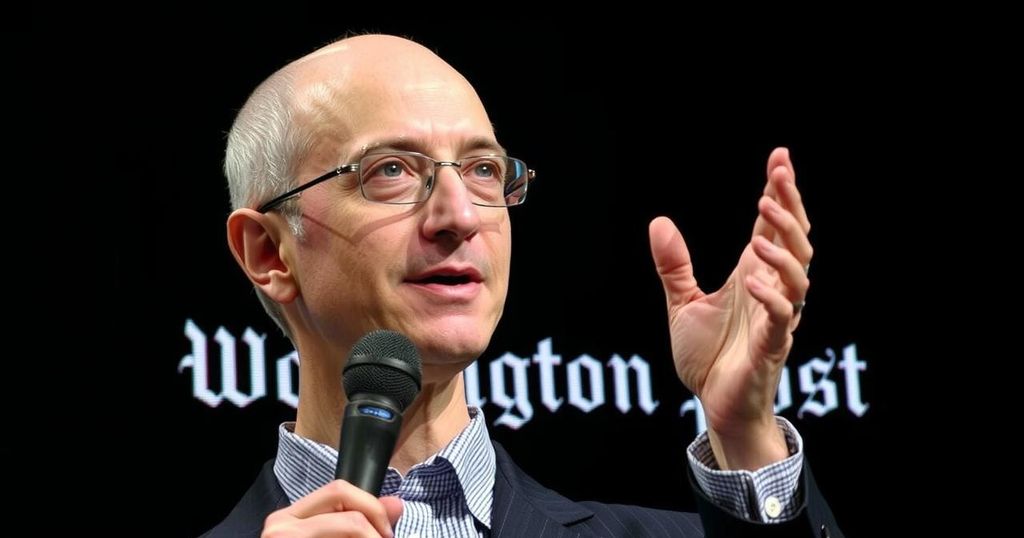Jeff Bezos Justifies The Washington Post’s Discontinuation of Presidential Endorsements
Jeff Bezos has defended The Washington Post’s decision to end presidential endorsements, claiming it will enhance credibility and mitigate perceptions of media bias. This move follows a significant cancellation of digital subscriptions attributed to the newspaper’s actions. Critics have expressed concerns regarding the timing and potential repercussions from political figures. The Post’s editorial management has reaffirmed a commitment to non-endorsement in the future.
Jeff Bezos, the owner of The Washington Post, publicly defended the newspaper’s recent decision to cease endorsing presidential candidates. This move emerged following a report indicating a substantial cancellation of approximately 200,000 digital subscriptions to the newspaper. National Public Radio (NPR) highlighted that the decision prevented an intended endorsement of Democratic candidate Kamala Harris, leading to dissatisfaction among some subscribers who directed their frustrations toward Bezos, the billionaire founder of Amazon and Blue Origin. In an opinion piece published in his own newspaper, Bezos articulated that most individuals perceive media to be biased, hence it is imperative for The Washington Post and similar outlets to enhance their credibility. He asserted: “Presidential endorsements do nothing to tip the scales of an election. What presidential endorsements actually do is create a perception of bias. A perception of non-independence. Ending them is a principled decision, and it’s the right one.” Critics posited that the timing of this announcement, occurring less than two weeks before the upcoming Election Day, raised questions about potential repercussions from Republican candidate Donald Trump if he were to win. Bezos clarified that no political figure had been consulted regarding the decision and emphasized that there was no exchange of favors with Trump, despite a meeting that occurred the same day between Trump and senior Blue Origin officials. William Lewis, the publisher and CEO of The Washington Post, reiterated the newspaper’s commitment to not endorsing presidential candidates this November and in future elections, stating that they are reverting to the foundational principles of the newspaper. With a rich journalistic legacy, The Washington Post is renowned for its indispensable coverage of significant historical events, securing 76 Pulitzer Prizes for its reporting. However, this recent decision has sparked unease among many of its journalists. Approximately 20 columnists have expressed their dissenting views through opinion pieces published on the newspaper’s website, with some resigning in protest. They articulated that the refusal to endorse a candidate signifies a grave misstep and a departure from the core editorial values of the publication.
The Washington Post is recognized as a prominent news organization that has a long-standing reputation for investigative journalism. Notable for reporting on critical historical events such as the Pentagon Papers and the Watergate scandal, the publication has won numerous awards for its journalism. The decision to refrain from endorsing presidential candidates reflects a shift in editorial policy, tied to the perceived bias in media, which has been a topic of concern among the readership and the journalistic community. The recent announcement also aligns with similar decisions made by other influential newspapers, raising discussions about the role of endorsements in the political landscape.
In summary, Jeff Bezos has justified The Washington Post’s decision to discontinue presidential endorsements as a necessary step to enhance journalistic integrity and eliminate perceptions of bias. While this decision has been met with backlash from some staff journalists and resulted in a significant loss of subscribers, it reflects the newspaper’s effort to uphold its foundational principles. The continued discourse within the journalistic community suggests that this decision may have lasting implications for how media institutions engage with political candidates in future elections.
Original Source: www.aljazeera.com




Post Comment